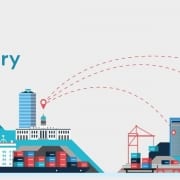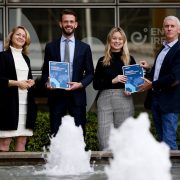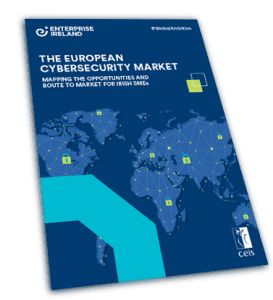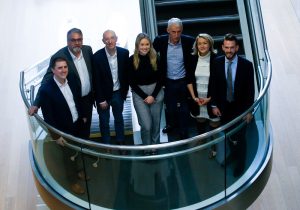5 ways to make the most of your Market Discovery Fund project
Learning that your business has been approved for a support like Enterprise Ireland’s Market Discovery Fund is great news. But it is followed by an important question. How can you make the best use of that financial support to maximise its value to your business?
1. Make the most of Enterprise Ireland’s resources
Use all of the resources available to you as a company supported by Enterprise Ireland while you carry out the project and conduct your research.
Your Development Adviser
Stay in touch with your Development Adviser throughout the project. Let them know you’re interested in attending relevant market and sector events and they will keep you top of mind.
39 overseas offices*
Make time to visit Enterprise Ireland’s most relevant overseas offices as part of your project. With offices in 39 locations worldwide, our advisers have expert knowledge of the markets and sectors of most importance to Irish exporters.
If you alert the in-market team to your visit well in advance, they may be able to arrange meetings with valuable local contacts. After your visit, remember to stay in touch with the market advisers you know to stay up-to-date with local opportunities and developments.
(*39 correct as of 3 December 2019, date of publication)
Market Research Centre
Conducting the right market research is vital to maintaining your competitive edge and enjoying successful export growth – but it can also cost time, money and resources for which your business must budget.
The information specialists at Enterprise Ireland’s Market Research Centre offer a wealth of experience available to guide you to the most relevant reports and databases for your needs, and to provide support before and during your visit. They can help you to access current market research reports from some of the world’s leading publishers, such as Euromonitor International, Frost & Sullivan, and Mintel. The Centre is available free-of-charge to companies supported by Enterprise Ireland across the regional office network.
2. Focus on your most promising markets
One important rule of thumb is to consider no more than three markets within a Market Discovery Fund project. Carrying out a market prioritisation exercise and comparing the potential of two or three markets within a region can be a smart use of this type of support.
Whichever markets you consider, remember that internet research alone will only take you so far. Travel to each market you are considering where feasible. You will learn far more on the ground than you can from behind a screen.
Also think carefully about the bandwidth (covering both people and finance) required to manage the project. Projects such as this typically take no more than six months, unless you recruit a graduate or entry-level executive to undertake a more substantial piece of research.
3. Assess trade fair options
If you are planning to exhibit at a trade fair, try to visit the year or season before, so you can assess if it really is a good fit for your business. The most important factor to look out for is if the right kind of buyers and decision-makers attend.
If it is a big fair, spend some time establishing which is the right hall for your company to exhibit in. Being in the wrong hall is a waste of time and resources and can leave you and your team feeling frustrated.
If you decide to exhibit next time around, get in touch with the organisers as early as possible to find out costings or packages in addition to availability, as previous exhibitors are likely to be given priority.
4. Know the claims process and track everything
You can find all the information and forms you need to submit your claim(s) to the Market Discovery Fund here. This includes:
- Instructions for making your claim
- The claim form
- A claim form checklist
- A timesheet template
- A Director’s Statement template
- A progress report form
- More information on the claims process.
While at this point your application has been approved, it is vital to keep detailed records of all expenditure relating to your project. This can include:
- Timesheets for employees, as relevant wages and salaries can be covered, subject to conditions outlined here
- Receipts and invoices for all foreign travel and subsistence expenses directly related to the project. Remember these must be incurred by company employees supported on the project
- The cost of purchasing reports and databases relating to a new market or sector (when relevant and not accessible through the Market Research Centre).
5. Understand the value of what you learn
At first, it might seem disappointing if research indicates that a valid opportunity to bring your product or service to a particular market or markets does not exist. But it is actually a great lesson.
It is far better to be aware of this insight before committing fully to a market, as discovering a lack of potential later will cost your business much more.
Knowing which markets not to prioritise can be just as important as understanding which ones are most worth investing your time and resources. Refining your overall market strategy is a valuable outcome of a successful Market Discovery Fund project.
Remember, you must contact your assigned Enterprise Ireland Adviser to discuss your Market Discovery Fund application before you submit it. If you’re a first-time applicant, you need to register on the Enterprise Ireland Online Application System.
To discover how your company can take the step into new markets, visit: globalambition.ie/steps.












 “Secondly, there is a saving on direct costs. Think about the cashflow impact that putting a direct salesperson into the Benelux region has from day one: payroll costs, expenses, and associated costs.
“Secondly, there is a saving on direct costs. Think about the cashflow impact that putting a direct salesperson into the Benelux region has from day one: payroll costs, expenses, and associated costs.
 O’Driscoll spoke about his memories of taking up the captaincy of the national team at the age of 23 and being daunted by his relative youth. He realised he needed help.
O’Driscoll spoke about his memories of taking up the captaincy of the national team at the age of 23 and being daunted by his relative youth. He realised he needed help.

